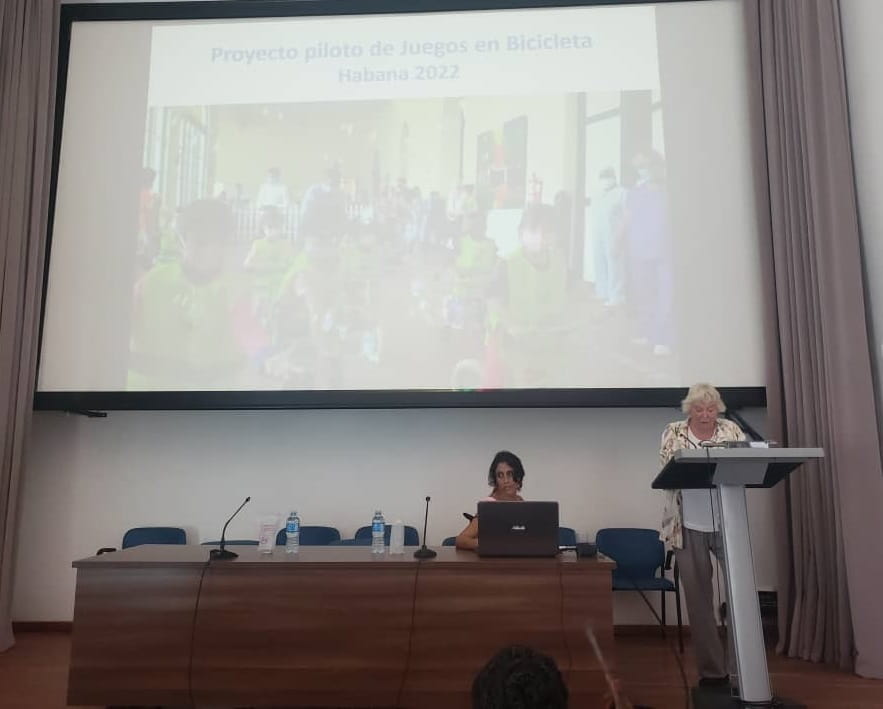
Advances and challenges of cycling in Havana.
With the purpose of identifying the advances in cycling and socializing experiences with heritage cities, the second international seminar The bicycle: use and recommendations for urban mobility was held in Havana's Palacio del Segundo Cabo. Center for the Interpretation of Cuba-Europe cultural relations.
The meeting, organized by the Civil Society Heritage, Community and Environment (SCPCMA), was attended by representatives of institutions from the Office of the City Historian, the General Directorate of Transportation of Havana, the Danish non-governmental organization Emergency, Architecture and Human Rights (EA-RH), as well as the Network of Offices of the Historian and the Curator of the Heritage Cities of Cuba and projects and micro, small and medium-sized enterprises.
In statements to Tribuna La Habana, Marta Onieda Pérez Cortés, president of civil society and coordinator of this international seminar, explained that in the first seminar, in January, the different actions related to the use of bicycles were addressed, but in this "We wanted to present the progress of the activities of the project, which has already been in the works for nine months, and also to see how progress has been made in this, both by state entities such as the General Directorate of Transport, which is also working with us and coordinating this seminar, and also other initiatives from different economic sectors".
"One of the novel elements of this project are the activities that we have carried out in the pilot centers, which are children's games using balance bicycles," said Perez Cortés about this initiative.
She specified that it includes three teaching modalities or spaces for early childhood that work in the country and specifically, in the Historic Center. One is the Vilma Niña Children's House; another, the Amiguitos del Comercio children's circle and, the third, the Pinocho toy library, located in different popular councils of Old Havana. "We wanted to support these centers in the popular councils of Belén, Jesús María and San Isidro, less favored from the point of view of their living and economic conditions, as another way of influencing."
The president of the SCPCMA, maintained that the possession of the bicycle is a very difficult issue, it is not prioritized, especially from childhood. With this project, with these children's games, they acquire certain skills. "The children's educators who were with us analyzing and assessing their experience have told us that it has been very favorable in different facets: mobility, balance, confidence, security, their social relationships, because somehow between them, They support each other when someone can't handle the bike or falls, the others immediately encourage them to get up, continue and wait for the bikes to arrive," he said.
As part of the project, they have developed children's games festivals in Old Havana, in Quinta de los Molinos, in Centro Habana; in Monte Barreto, in a fair of undertakings related to the protection of the environment, in Playa; in the Hábitat park and in other activities where they have been summoned, some together with the Local Development Project and Mipyme Vélo Cuba, in what constitutes one of the impacts of the project, Pérez Cortés considered.
On this occasion, said the president of civil society, we wanted to transmit that experience to the cities that are part of the Network of Offices of the Historian and the Curator of the Heritage Cities of Cuba to see what has been done to the extent of the possibilities, if they already have the Special Comprehensive Development Plan, if they are preparing mobility plans or those who have already advanced with a certain project that has to do with the use of bicycles in their cities, based on the characteristics of each one.
"This has been the great novelty that this seminar has had. I think they are happy because it has made them stop and think about what they have done and think about what they could do with that topic as well," he said, expressing satisfaction with the advances in the promotion of cycling, while admitting that much needs to be done to raise awareness, raise awareness and carry out actions in infrastructure, bicycle lanes and even in urban trees, due to their protective function.
In the seminar, part of the project Support for the development of urban cycling in Havana, topics such as Neomobility, for low-emission transport in Havana; Ha'Bici-Neomobility bicycle system; urban cycling and international cooperation, educational actions, urban infrastructure, integration with public transport and road safety.
A novelty in this second edition was the participation of heritage cities such as Trinidad, Camagüey, Sancti Spíritus and Remedios, among others. The projections for Trinidad and Sancti Spíritus were presented by representatives of the respective master plans.
In the panel Contribution of bicycle games to child development, the experiences of cycling in early childhood for healthy development, the Children's House for healthy development, the Amiguitos del Comercio children's circle and the Pinocho toy library were included.
Likewise, the Cycling Mobility Plan of the Historic Center of Havana, the projections for the manufacture of wooden bicycles by InSURgentes and the Mipyme and the experience of the Vélo Cuba Local Development Project, which prepares conditions for the future production of cycles, were presented. of bamboo and the eco-friendly messaging of Enbielas.